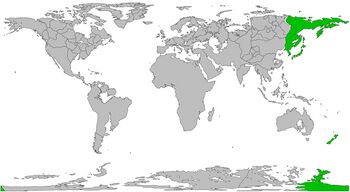Sibra
This article is incomplete because it is pending further input from participants, or it is a work-in-progress by one author. Please comment on this article's talk page to share your input, comments and questions. Note: To contribute to this article, you may need to seek help from the author(s) of this page. |
Federation of Sibra
| |
|---|---|
|
Flag | |
 | |
| Capital | Oldjikan |
| Largest city | Velidovo |
| Official languages |
|
| Religion |
|
| Demonym(s) | Sibran |
| Government | Federal Premist Constitutional Republic |
• Premier | Akira Lebedev |
• Surrogate Premier | Feliks Rasputin |
• Minister of the Council | Daichi Ishida |
| Legislature | National Council |
| Area | |
• Total | 5,209,402 km2 (2,011,361 sq mi) (3rd) |
| Population | |
• 3000 census | 1,998,109,633 (3rd) |
• Density | 383.6/km2 (993.5/sq mi) (20th) |
| GDP (PPP) | 3000 estimate |
• Total | $155.6 trillion (3rd) |
• Per capita | $77,890 (9th) |
| GDP (nominal) | 3000 estimate |
• Total | $151.5 trillion (3rd) |
• Per capita | $75,845 (10th) |
| Gini (3000) | 35 medium (27th (tie)) |
| HDI (3000) | 0.943 very high (7th (tie)) |
| Currency | Sibran Zolot (SBZ) |
| Time zone | UTC+9, +10, +11, +12 (Western Sibran Time, Central Sibran Time, Economic Sibran Time/Antarctic Sibran Time/East-Central Sibran Time, Eastern Sibran Time) |
Sibra, officially the Federation of Sibra, is a nation in northeastern Asia and northeastern-180 Antarctica. In Asia it is bordered by Wody to the northwest, Hanga to the west, and the Goby Uninhabitable Region (GUR) to the southwest. In Antarctica it is bordered by the Federation of Sol to the west and Laka to the east. In Asia it has a coast with Lake Lena to the west, the Laptev Sea to the northwest, the East Sibran Sea to the north, the Chukota Sea to the northeast, the Bering Sea to the east, the Pacific Ocean to the south, the East Zonhan Sea to the south-southwest, the Yellow Sea to the west-southwest, and the Okota Sea, Shelikhov Sea, and Nihon Sea are almost surrounded by Sibra on the southern coasts. Zealand Region has a coast with the Tasman Sea to the west, the Southern Ocean to the south, and the Pacific Ocean to the northeast and east. In Antarctica it has a coast with the Ross Sea to the northeast, the Southern Ocean to the north, the George Sea to the northwest, and the Federation Sea to the west.
Sibra ranks very high in civil liberties, high in HRC-FS human rights, and high in political freedom. Sibra is a member of the Human Rights Coalition (HRC) and is a sovereign member of the Federation of Sol. Civil liberties are highly respected and Sibra is a leading pioneer for civil liberties, unlike most other mining countries. The Antarctic regions of Sibra where most mining is done does have flaws in civil liberties and democracy, which would have them rated moderately high for civil liberties and moderately in political freedom.
The Sibran economy is very diverse and is the largest economy located on Earth; second largest overall after the Federation of Sol. Manufacturing, mining, technology, pharmaceuticals, and chemicals dominate the Sibran market. Sibra produces a majority of Asia’s pharmaceutical and chemical products and a significant portion of the world’s manufactured goods, technology, and mineral products. The Antarctic regions of Sibra contain all of Sibra’s mining operations, including petroleum. Mineral and petroleum refineries are also all located in the Antarctic regions. Marine and air technology is vital for transportation between the Antarctic and Asia regions. Hovercrafts, supersonic jets, and vacuum trains are the highlights of Sibran transportation technology. The Transpacific Vactrain was built and financed almost exclusively by Sibra with some contributions by Laka, Meco, and Free Republic for their respective segments. When the Transpacific Vactrain is not in operation or dangerous materials are being transported, high speed hovercrafts are used for traversing the Pacific Ocean.
Etymology
Sibra was named after the whole area formerly known as Siberia, which extended from modern day Qazin to Sibra. Siberia itself has long had unknown origin, with many theories stemming from various languages. The most probable could be the ancient Golan words of "sibir" or "sheber" which meant "dense forest."
